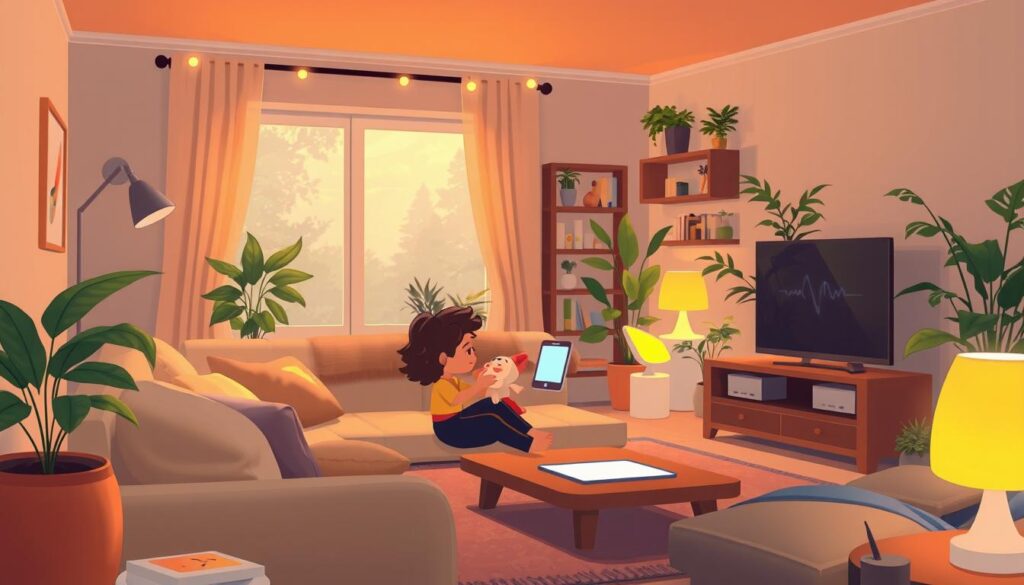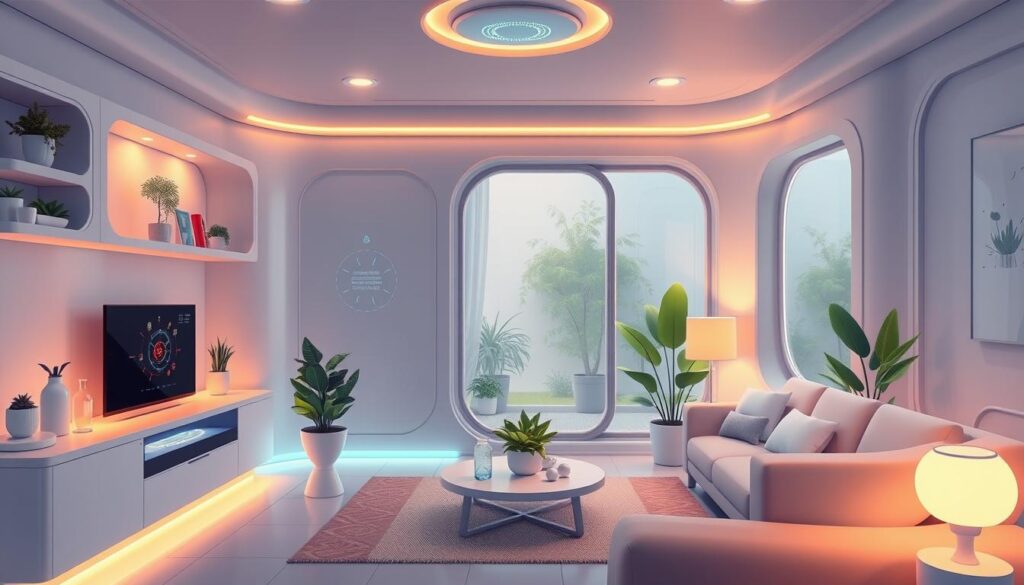During the COVID-19 pandemic, interest in smart home tech soared. Neuroscientists found our heart rate spikes when we think of home, just like when we think of loved ones. This shows smart home tech helps us feel a strong emotional tie to our homes.
Smart homes are more than just convenient; they’re key to our emotional health. As we move forward, smart home tech is vital for a personalized, connected life. Features like voice control and home security make our lives better and deepen our connection to our homes.
The Rise of Smart Homes
The smart home revolution is changing how we live. It’s making our homes more convenient and innovative. The market for smart homes is expected to hit $121 billion by 2022. More Americans are now using smart technology for voice control, energy efficiency, and home security.
Intelligent Living and Personalized Environments
Smart home tech is changing how we interact with our homes. With *voice control*, managing your home is easy. *Connected devices* work together to make your life better, tailored to what you like. You can control the temperature, lighting, and even keep an eye on energy use and security.
As more older Americans live longer, smart home tech is becoming more popular. It helps the elderly with safety, comfort, and managing daily tasks. Features like fall detection and health monitoring make life easier.
Thanks to better standards like the Matter standard, smart home tech is getting easier for everyone. It lets users of all ages enjoy smart home benefits. This means homes can adapt to your needs and make life easier.
Beyond Convenience: Emotional Connections
Smart home tech is known for making life easier and more efficient. But it also helps build stronger emotional ties between people and their homes. Studies show that how well people use smart homes matters a lot. This means making designs that focus on what users need to get more people to use these technologies.
These smart homes help people feel a deeper connection to their homes. They’ve moved from just controlling lights and heating to systems that know what you need. By using ICTs, IoT, big data, and AI, people of all ages can live better lives. They get more safety, health, comfort, and freedom.

Research shows that people with smart homes feel happier and more connected when they think about their homes. This shows that smart homes do more than just make life easier. They help create a personal, intelligent living space that brings families closer together.
Smart Homes: Beyond Convenience, Building Emotional Connections
Technology is changing our homes in big ways. Smart home systems are now more than just convenient and efficient. They help build strong emotional bonds within the home. By making homes more automated and personalized, we feel a deeper connection to our living spaces.
Voice control and connected devices are just the start of what smart homes can do. They help families bond, care for the elderly, and live more intelligently. These homes become a key part of the family, not just a bunch of gadgets.

Smart home technology has a big emotional impact. It’s not just about being convenient. It makes us feel more attached, secure, and connected in our homes. The future of smart homes is about more than saving energy and automating tasks. It’s about improving our emotional well-being and building strong connections with others.
The Impact of AI on Home Relationships
Smart home technology is getting better, and we need to think about how AI affects our home life. AI can make us feel closer to robots, which can help teams work better. But, we also need to worry about some issues.
Potential Concerns and Ethical Considerations
Too much love for AI devices like smart speakers can lead to privacy problems. Users might forget their talks are being recorded. There are also big questions about using AI at home, like the risk of being tricked or losing real human connections.
As AI changes our homes with things like voice control and security, we must find a balance. We want the benefits of convenience and feeling closer to our loved ones. But, we can’t ignore the privacy and ethical issues.
AI companions are making us question our need for real friends and family. They can act like friends, changing how we see friendship and companionship today. Some think AI can’t replace real human feelings, but others see it as a new kind of friendship.
As technology gets closer to being like us, the line between humans and machines is fading. AI is changing how we interact with each other, showing it could change our social lives and personal spaces a lot.
